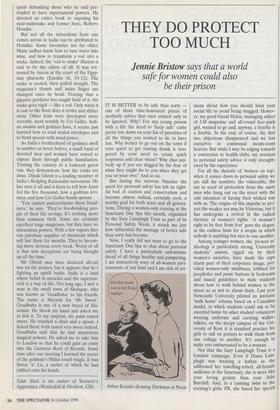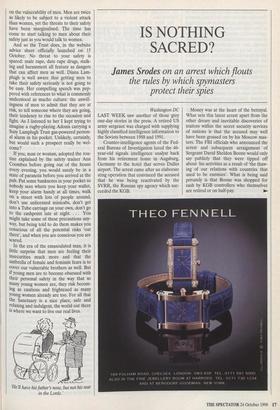THEY DO PROTECT TOO MUCH
Jennie Bristow says that a world safe for women could also be their prison IT IS BETTER to be safe than sorry — one of those time-honoured pieces of motherly advice that once existed only to be ignored. Why? For any young person with a life the need to 'keep safe' came pretty low down on your list of priorities of all the things you wanted to do to have fun. Why bother to go out on the town if your quest to get roaring drunk is tem- pered by your need to retain quick responses and clear vision? Why chat any- body up if you are dogged by the fear of what they might do to you when they get you on your own? And so on.
But during the nervous Nineties the quest for personal safety has left its right- ful bed of caution and conservatism and become almost radical, certainly cool, a worthy goal for both sexes and all genera- tions. During a women-only evening at the Sanctuary Day Spa this month, organised by the Suzy Lamplugh Trust as part of its Personal Safety Week, it struck me just how influential the message of better safe than sorry has become.
Now, I really did not want to go to the Sanctuary Day Spa to chat about personal safety. I have a particularly unfeminine dread of all things healthy and pampering, I am instinctively wary of all-women envi- ronments of any kind and I am sick of ser- Arthur Koestler dictating Darkness at Noon mons about how you should limit your social life to avoid being mugged. Howev- er, my good friend Helen, managing editor of LM magazine and all-round face-pack girl, wanted to go and, anyway, a freebie is a freebie. In the end, of course, the first two objections disappeared and we lost ourselves in communal steam-room heaven. But while I may be edging towards a conversion to health clubs, my aversion to personal safety advice is only strength- ened by the experience.
For all the rhetoric of 'women on top', when it comes down to personal safety we are still the sensitive, the vulnerable, the sex in need of protection from the nasty men who hang out on the street with the sole intention of having their wicked way with us. The origins of this impulse to pro- tect the weaker sex may be Victorian, but it has undergone a revival in the radical rhetoric of women's rights. 'A woman's right to be free from fear' goes the slogan, in the endless hunt for a utopia in which nobody is anything but nice to one another.
Among younger women, the 'protect us' ideology is particularly strong. University students' unions, egged on by their women's societies, have made the rape alarm part of their corporate image, pro- vided women-only minibuses, lobbied for peepholes and panic buttons in bedrooms and issued guidelines to male students about how to walk behind women in the street so as not to alarm them. Last year Newcastle University piloted an intricate 'walk home' scheme based on a Canadian model, in which students could ask to be escorted home by other student volunteers wearing uniforms and carrying walkie- talkies; on the sleepy campus of the Uni- versity of Kent it is standard practice for girls to call on porters to walk them from one college to another. It's enough to make you embarrassed to be a woman.
Not that the Suzy Lamplugh Trust is a feminist campaign. Even if Diana Lam- plugh was wearing a kaftan as she addressed her towelling-robed, all-female audience at the Sanctuary, she is more like your loving granny than your Julie Burchill. And, in a cunning twist to the evening's girlie PR, she based her speech on the vulnerability of men. Men are twice as likely to be subject to a violent attack than women, yet the threats to their safety have been marginalised. The time has come to start talking to men about their safety just as you would talk to women.
And so the Trust does, in the website advice sheet officially launched on 15 October. No threat to your safety is spared: male rape, date rape drugs, stalk- ing and harassment all feature as dangers that can affect men as well. Diana Lam- plugh is well aware that getting men to take their safety seriously is not going to be easy. Her compelling speech was pep- pered with references to what is commonly understood as macho culture: the unwill- ingness of men to admit that they are at risk, to tell someone where they are going, their tendency to rise to the occasion and fight. As I listened to her I kept trying to imagine a rugby-playing Adonis carrying a Suzy Lamplugh Trust gas-powered person- al alarm in his pocket. Unlikely, certainly, but would such a prospect really be wel- come?
If you, man or woman, adopted the rou- tine explained by the safety trainer Ann Coombes before going out of the house every evening, you would surely be in a state of paranoia before you arrived at the pub. Put some banknotes in your pocket so nobody sees where you keep your wallet, keep your alarm handy at all times, walk on a street with lots of people around, don't use unlicensed minicabs, don't get Into a Tube carriage on your own, don't go to the cashpoint late at night. . . . You might take some of these precautions any- way, but being told to do them makes you conscious of all the potential risks 'out there', and when you are conscious you are scared.
In the era of the emasculated man, it is little surprise that men are feeling their insecurities much more and that the umbrella of female and feminist fears is to cover our vulnerable brothers as well. But if young men are to become obsessed with their personal safety in the way that so many young women are, they risk becom- ing as cautious and frightened as many Young women already are too. For all that the Sanctuary is a nice place, safe and relaxing and indulgent, the world out there is where we want to live our real lives.
'He'll have his father's nose, but not his seat in the Lords.'



















































































 Previous page
Previous page